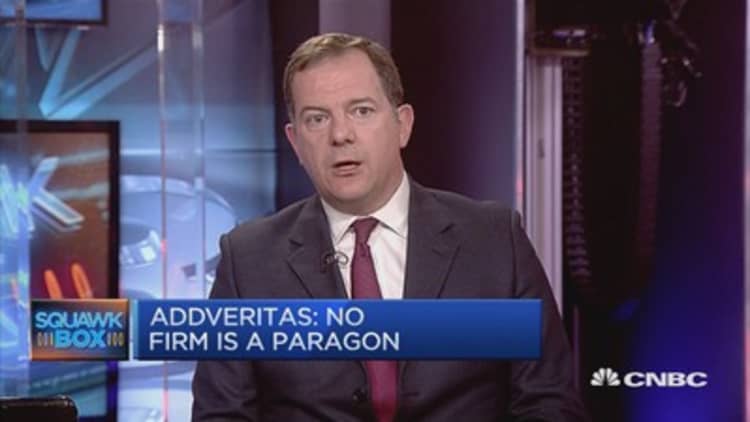The repeated attempts by Barclays' Chief Executive Officer (CEO) Jes Staley to uncover the identity of a whistleblower at the British bank demonstrates how employees' confidence in their ability to raise grievances can be easily shattered, according to the partner of a consultancy which helps firms to establish robust whistleblowing systems.
"Jes Staley has, at a stroke, punctured the trust that his workforce has in this incredibly important thing," Dino Bossi, partner at Addveritas, told CNBC's Squawk Box on Tuesday.
While conceding that Staley's first attempt to discover the complaint's identity could potentially be considered as the less offensive if the CEO was truly ignorant of the process's legal protections, persisting with the attempt once the inquiry had concluded was a more serious action, according to Bossi.
"That does reveal a fundamental lack of understanding in the central importance to trust and confidence around having a successful whistleblowing system," he added.
Bossi contends that whistleblowers are looking for three guarantees when they decide to raise a concern about a wrongdoing in their workplace. Firstly, they want systems which they can access, secondly, they want their confidentiality to be protected and finally, they want to know that the concern they have raised has been sufficiently addressed.
"If they don't believe that, your whistleblowing system can be the most expensive, best of breed system in the world but nobody will ever use it," asserted the Addveritas partner.

The Dodd-Frank bill introduced in the U.S. in 2010 included a batch of provisions designed to help protect whistleblowers, which has indeed succeeded in improving the situation for them, says Erika Kelton, an attorney at legal firm Phillips & Cohen.
"In the U.S., financial whistleblowers are coming forward in greater numbers because of the confidentiality, employment protection and, in particular, financial rewards that the Dodd-Frank Act provides them," Kelton told CNBC via email on Tuesday.
However, the situation is less encouraging in the U.K., says the attorney who has helped clients secure three Securities & Exchange Commission (SEC) whistleblower awards during her career and who recently relocated from Washington D.C. to London.
"In the U.K., the number of whistleblowers who have reported wrongdoing to the Financial Conduct Authority (FCA) has dropped over the past two years – I believe that drop is attributable to the fact that the FCA does not offer whistleblowers rewards. Individuals risk their livelihoods when they speak out, and rewards help balance those risks," Kelton affirmed.
As regulators in both jurisdictions continue their ongoing review of how to fairly optimize whistleblowing procedures and protections, two questions present particularly acute headaches.
Firstly, whether the correct course of action is to impose a large fine on the errant company, when in reality it is shareholders and other stakeholders - such as the entire employee base - who pay the penalty rather than the individual perpetrators of the misconduct.
Secondly, how to stay one step ahead of digital advances in order to ensure adequate protection for whistleblowers when information can be so rapidly leaked and disseminated in today's tech-centric world.
If whistleblowers don't believe they have adequate protections to speak up internally, they may reach out to the media, regulators and legislators, often leading to an undesirable outcome for companies, says Bossi.
"Treat them well and whistleblowers are assets – treat them poorly and they will become liabilities," he concluded.


